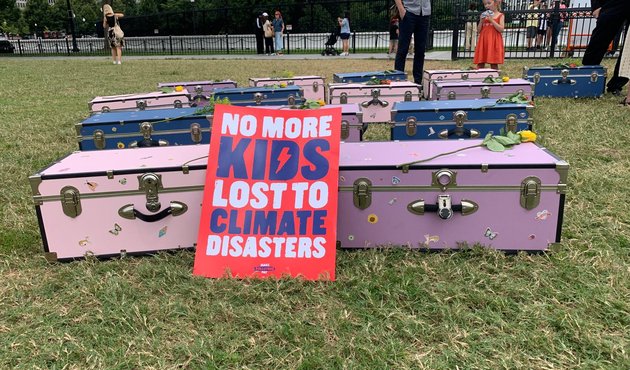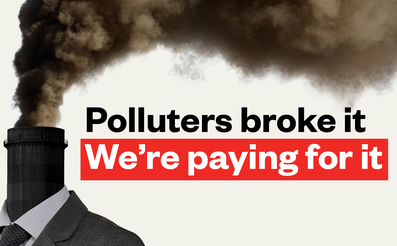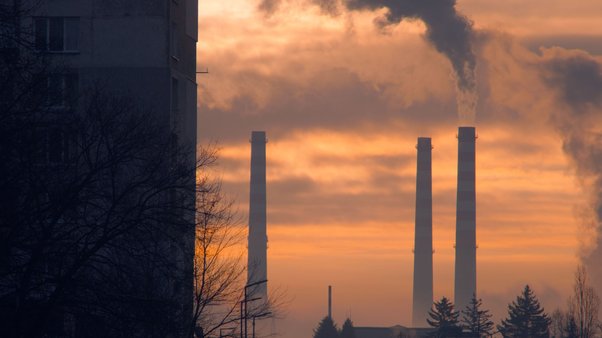Climate change played a role in the devastating floods, yet the fossil fuel industry continues to receive billions in subsidies while emergency funding is slashed
On July 4, President Donald Trump signed into law the One Big Beautiful Bill Act. The giant bill slashes clean energy funding, rescinds funds allocated for weather forecasting and climate resilience, and hands the fossil fuel industry billions in new tax breaks. Only two House Republicans voted against it, joining all Democrats.
Earlier on the same day, flash floods swept through central Texas after up to 20 inches of rain fell across parts of the state. At least 135 people, including dozens of children, were killed after the Guadalupe River rose 26 feet in less than an hour.
Hotter temperatures mean the air can hold more moisture, leading to more extreme rainfall. Research has shown that the climate crisis, which is caused largely by burning fossil fuels like oil and gas, has led to every region of the US seeing more extreme rainfall events as temperatures are driven higher.
The call for reversing US federal cuts
In the months before the Texas floods, Trump’s administration cut hundreds of positions from the National Weather Service and its parent agency, the National Oceanic and Atmospheric Administration, which Americans rely on for timely weather forecasting.
At a memorial for child flood victims organized outside the White House on July 21 by Texas Moms Rising and the Make Polluters Pay campaign, activists called for those cuts to be reversed. They also called out the fossil fuel industry for its role in driving climate change.
Standing near 27 trunks representing the children who died at Camp Mystic, a summer camp near the Guadalupe, Samantha Gore, a Texas native organizing with Climate Families NYC, said: “We’re here to hold polluters financially accountable. We’re here to get the government out of bed with Big Oil.”
It was widely reported that Texas Governor Greg Abbott, a Republican, said that seeking to assign blame for the flooding was “the word choice of losers.” Abbott accepted over $7 million from the oil and gas industry in his 2022 campaign, according to Open Secrets.
Storm defense projects vs US fossil fuel industry subsidies
Over the last decade, Texas has failed to spend hundreds of millions of dollars in hazard mitigation funding allocated by the federal government, according to E&E News.
At the same time, Abbott and the state’s Senate delegation have spent years lobbying for billions in federal funds for a massive infrastructure project protecting the coast from storm surges.
Some of the biggest beneficiaries of this project would be the refineries and petrochemical plants that crowd the Gulf Coast.
But this money pales in comparison to fossil fuel subsidies at the federal level. The nonprofit FracTracker Alliance estimates that the US fossil fuel industry is propped up by $760 billion in direct and indirect subsidies every year.
Most of that figure is made up of “externalities” – the costs of the climate crisis that our society has so far allowed the industry to escape paying.
Making governments and Big Oil polluters accountable
The US Congressional Budget Office estimates that flood damage has cost the country an average of $46 billion per year over the past decade.
In the weeks since the Texas disaster, heavy rains caused flooding that killed two women in New Jersey and inundated the New York City subway. Three people, including two young children, died in a flash flood in New Mexico. A grandmother and retired dentist was killed in a flash flood in Kansas.
The number of flash flood alerts issued so far in 2025 exceeds any other year on record, going back to 1986.
Five days after the Texas floods, Governor Abbott called a special session of the state legislature to begin on 21 July, the same day as the DC vigil. Four items on its eighteen-point agenda relate to flood warning systems and emergency relief. Others include a trans-exclusionary bathroom bill and an attack on abortion rights.
The agenda also includes an item that some believe is the real purpose of the session: redrawing Texas’s Congressional maps to help Republicans gain five seats, thus protecting Trump’s party in the 2026 midterms.
According to one analysis, the One Big Beautiful Bill Act – which passed by four House votes – will result in the US emitting some 310 million metric tons more carbon dioxide by 2035 than it otherwise would have, locking in more global heating and subsequent extreme weather.
“We need more than thoughts and prayers,” said Nyeka Arnold, the founder of Austin non-profit The Healing Project, at the children’s memorial. “We need accountability.”
While communities are still grieving their losses and cleaning up after disasters, the fossil fuel industry is raking in billions. We have to hold the industry accountable for the damage it’s done and force it to pay its fair share to help fix what it’s broken. You can support this effort by joining 39,000 people and signing the Polluters Pay Pact now.




